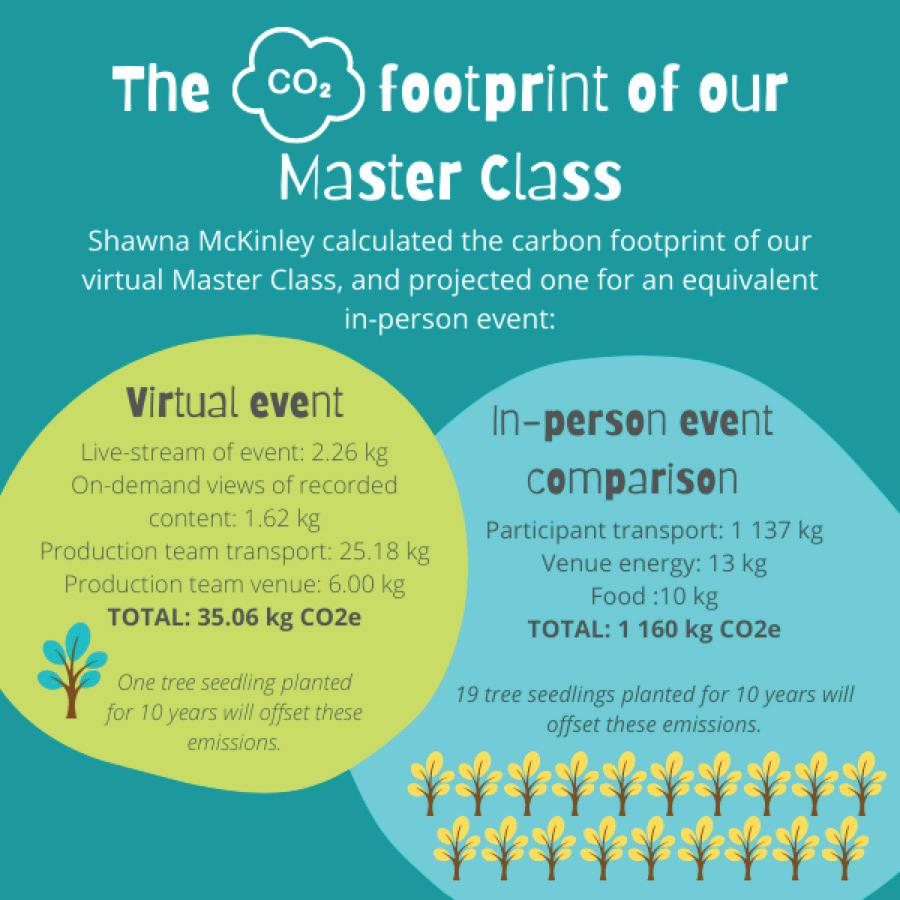
4 minute read
EVENT GREENING FORUM
Ways to shrink your event’s carbon footprint
Different event formats have wildly differing carbon impacts. Understanding this can make for savvy event planning decisions.
Advertisement
Last year, the Event Greening Forum held a virtual Master Class on the topic #BuildBackBetter, unpacking how to host events that support best practice standards for preventing the spread of Covid-19 and promoting sustainable outcomes.
One of our international speakers was Shawna McKinley, a sustainability consultant, event planner, author and instructor based in Canada. She spoke about which event planning decisions have the greatest influence on your event’s carbon footprint – which is the amount of greenhouse gases your activities release into the atmosphere, which in turn contribute to climate change.
Not all greenhouse gases contribute to climate change equally. Because of this, a standardised measure – carbon dioxide equivalents, often written as CO²e – has been created to measure and account for all greenhouse gas emissions equitably.
Ms McKinley identified four key areas as having the biggest impact on your event’s carbon footprint when compared to all other decisions: the event format (virtual, hybrid or in-person), the energy supply (where renewable energy is best), the venue’s sustainability (which usually refers to how well it uses resources), and switching to plant-based diets. So she recommends these are the four things event planners prioritise when deciding where to focus their energy and resources to produce an event with a low carbon footprint.
It’s not surprising that taking events online, in part or whole, can significantly reduce your footprint. McKinley noted that hybrid events can reduce carbon emissions by sixty per cent or more. She also calculated the emissions of our virtual Master Class and what an equivalent in-person event would have produced. A number of estimates were used, but the online event worked out as having three per cent of the greenhouse gas emissions that the in-person alternative would have had: 35kg CO²e for the virtual event versus 1 160kg CO²e for in-person.

At a traditional event transport is by far the biggest carbon contributor, followed by energy and then food. The virtual event had a minimal transport impact of 25.18kg CO²e for a production team of four people, whereas the impact would have been 1 137kg CO²e if this event had been held in person. This included four Cape Town participants flying to Johannesburg for the event.
Keep in mind that there are many ways to reduce the transport requirements of an in-person or hybrid event. This includes choosing a destination close to where most of your delegates are based, finding a venue on a public transport route and offering delegates complimentary travel passes for it, choosing hotels within walking distance to your venue, using electric cabs where possible, opting for direct flights and so forth.
In terms of energy use, the virtual event’s production team’s produced 6kg CO²e, while the in-person alternative would have produced 13kg CO²e. This would typically be influenced by the energy efficiency of the venue as well as the power source. By using renewable energy certificates the carbon emissions can be offset.
Refreshments are an important part of an event, which would add a further 10kg CO²e to its footprint. This could have been influenced by providing local, seasonal and organic food, while avoiding meat would have a significant impact on the footprint of the food.
It’s important to note that Ms McKinley was not advocating that in-person events be exchanged for virtual ones. Rather she pointed out that this understanding is hugely valuable when you are planning your events with sustainability in mind. She said: “We need to consider the experience model that makes the most sense to achieve the event outcome, filtered through a lens of which model provides the least amount of environmental impact, and aligns best with our audience values.”
With respect to our Master Class, taking it online was not only safer from a Covid-19 perspective, but it also made it easier for participants from around the country to join in, who may not have been able to attend otherwise. We could also seamlessly host two international speakers and make the event free-toattend for our members. These factors were all aligned with our priorities for this event, so this format made the most sense.
Any event planning may, however, aim to reduce its carbon footprint by considering transport, energy, the venue selection and catering options for the event.
About the EGF
The Event Greening Forum (EGF) is a non-profit organisation that promotes sustainability within the business events sector. It does this by hosting educational sessions for industry and lobbying government in an effort to implement sustainability principles into the daily operations of the events industry. The EGF was established through dedication and support of eight industry associations who are recognised as founding members. The founding members are key industry associations working together to promote South Africa as a destination for various types of events.
Want to know more?
If you would like to know more about event greening, visit wwweventgreening.co.za where you can browse the free resources, sign up to the monthly newsletter, or contact them directly with any queries.
Contact: Lynn Mcleod
T: 082 891 5883 E: lynn@eventgreening.co.za










